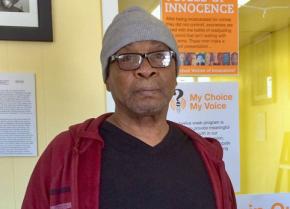Where’s the justice for Glenn Ford?
reports on the case of Glenn Ford, who spent decades in prison for a crime he didn't commit--and asks why Louisiana won't compensate him.
THE LOUISIANA justice system isn't known for its humane treatment of prisoners--and with the recent denial of compensation to exonerated death row prisoner Glenn Ford, the state more than lives up to its reputation for harsh injustice.
Ford was convicted by an all-white jury for the 1983 robbery and murder of Shreveport watchmaker Isadore Duncan, and sent to death row in 1984. From the beginning, Ford stated that he was nowhere near the crime scene when the murder occurred. He was convicted based on shaky testimony from an eyewitness who later admitted that she lied about Ford's involvement in the crime.
Three decades after his conviction, Ford's lawyers at the New Orleans Innocence Project, in conjunction with parish prosecutors, began filing motions stating that another man had confessed to the crime. A confidential informant tipped off prosecutors to the fact that one of the original co-defendants in the case was the real triggerman in the murder of Duncan. Ford was finally released from death row in March 2014.

Ford served 30 years on death row in Louisiana's notorious Angola prison. Especially toward the end of his time there, he faced a series of medical issues that the prison failed to adequately address. An article in the Atlantic at the time of Ford's release described his experience:
Ford has gained a great deal of weight recently--30 pounds or so, according to his attorneys--and he had long complained to prison doctors about a variety of ailments and illnesses. Before he left the prison on Tuesday, he reported to the medical office for a physical. However, by the time he got there, ready for inspection, Ford told his attorneys that prison staff already had completed his medical form and handed it to him.
Now, after being out for only a year, Ford has been diagnosed with stage IV lung cancer--doctors have given him less than a year to live.
UNFORTUNATELY, A judge ruled in late March this year to deny compensation to Ford. Ford is appealing the decision, but the process in the courts could take years--time that he does not have.
The state is claiming that Ford is not "factually innocent"--because they say he had knowledge that the robbery would take place. The decision is one even the man who prosecuted his case disagrees with. In a letter to the Shreveport Times, A.M. "Marty" Shroud wrote, "Glenn Ford should be completely compensated to every extent possible because of the flaws of a system that effectively destroyed his life. The audacity of the state's effort to deny Mr. Ford any compensation for the horrors he suffered in the name of Louisiana justice is appalling."
In a recent profile in the New Orleans Times-Picayune, Glenn described living with lung cancer, "I wake up in pain, right in the back of my throat. It feels like my throat has been slit. Every time I eat something or drink something...it's a whole explosion of pain."
He described his life as a free man over the last year, "I had choices that I never had in 30-some-odd years. I had decisions to make that I never made. It was catch it as I go--try to keep up. That's where I've been for the past year, trying to catch up."
The state of Louisiana stole 30 years of Glenn Ford's life--and released him from prison with just $20 in his pocket. Now the state is fighting a measly compensation of a little over $300,000 to Ford--which is already drastically less than many states offer to exonerated prisoners.
Now Ford faces a second death sentence. He should have the chance to live as well as he can during the time he has left. He should be given the means to seek the best medical care, and to travel and spend time with his family, including his many grandchildren. Justice delayed is justice denied--all the more so in this case. Glenn Ford deserves every penny and more of the compensation he is entitled to from the state of Louisiana.


